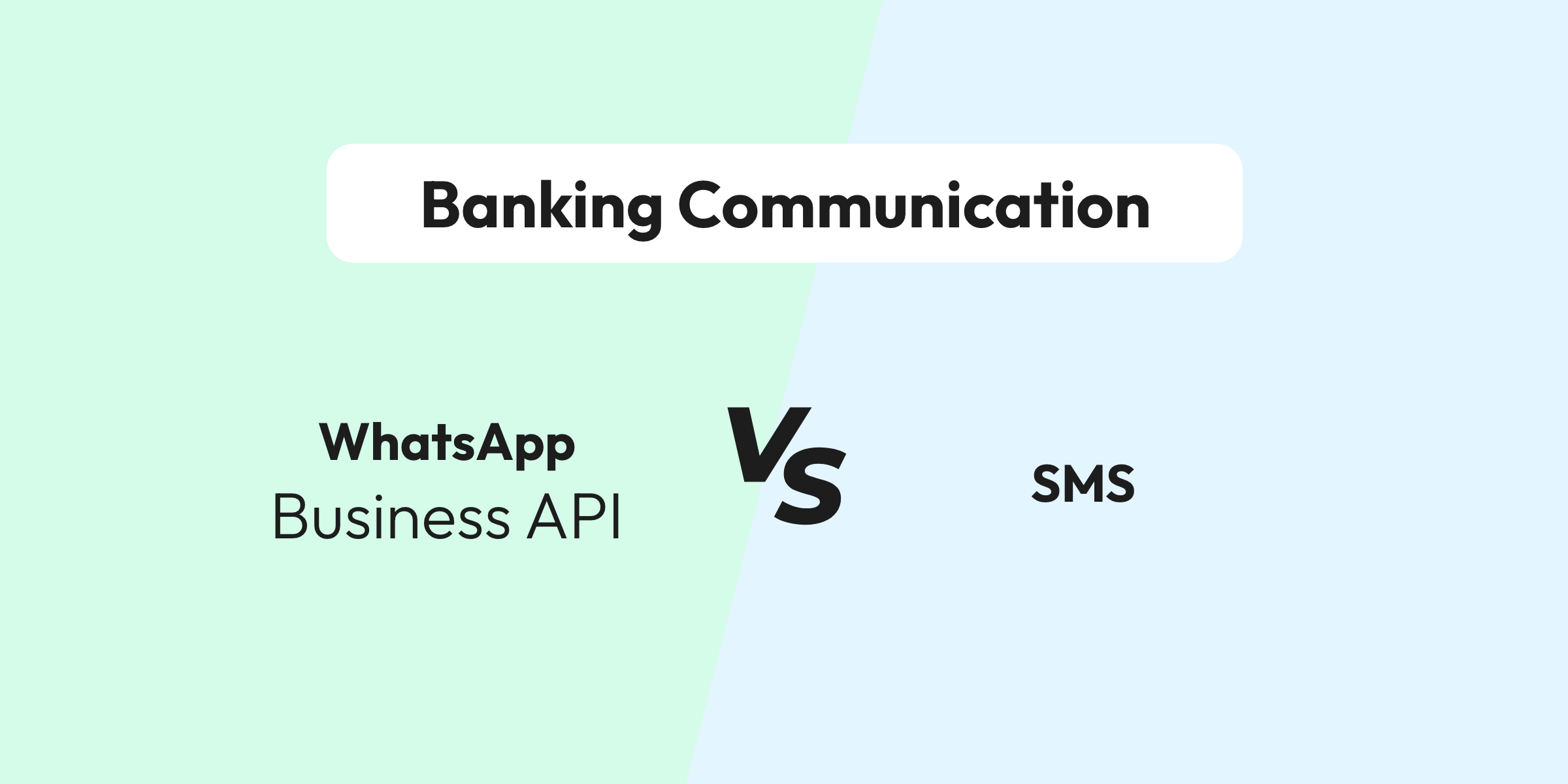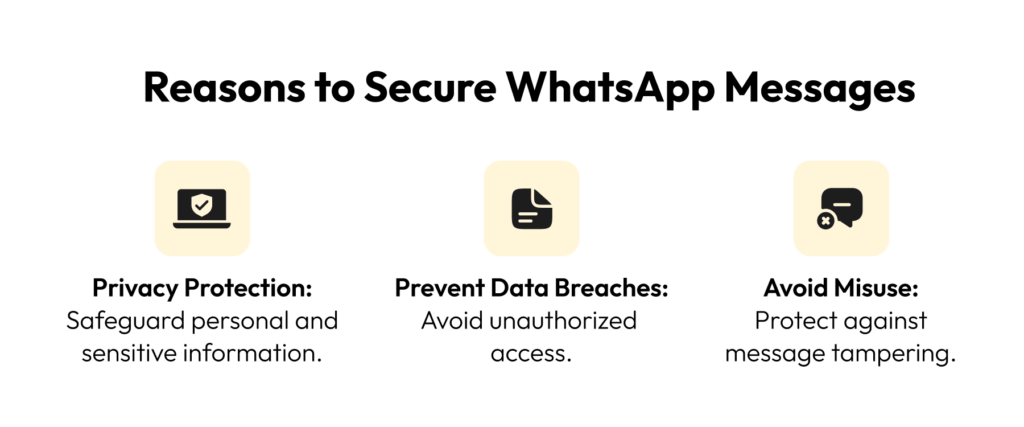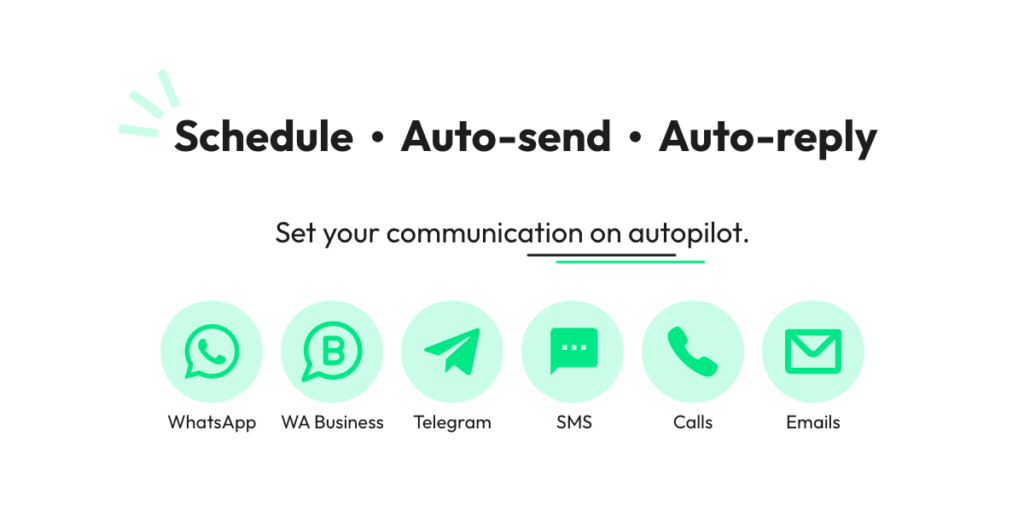-
-
FeaturesคุณสมบัติPenyelesaianRecursosFiturCaracterísticas精选功能精選功能المزايا
-
Solutionsโซลูชั่นPenyelesaianSoluçõesSolusiSoluciones解决方案解決方案الحلول
-
IntegrationsการผสานรวมIntegrasiIntegraçõesIntegrationsIntegraciones集成平台整合دمج مع تطبيقات أخرى
-
Affiliate/Partnersพันธมิตร/พันธมิตรทรัพยากรAfiliasi/Rakan KongsiAfiliados/ParceirosAfiliasi/MitraAfiliados/Partners联盟/合作伙伴聯盟/夥伴شريك
-
ResourcesจองการสาธิตSumberRecursosSumber dayaRecursosالموارد

Banking Communication: WhatsApp Business API vs. SMS
As we explore the landscape of banking communication, we find the WhatsApp Business API emerging as a formidable force, transforming the way banks interact with their clients. This robust platform transcends the capabilities of the good old SMS, providing a rich, interactive environment for customer engagement. With its ability to send notifications, alerts, and even conduct two-way conversations with ease, the WhatsApp Business API is reshaping expectations and setting new standards.
SMS banking, traditionally a staple for text-based banking notifications, remains a dependable option due to its simplicity and broad accessibility. However, in an era leaning towards dynamic and feature-rich platforms, SMS banking faces clear constraints as customer preferences evolve.
The article aims to demystify WhatsApp Business API and SMS for banking communication. Our goal is to educate and empower banking professionals with a thorough understanding, helping them to choose the best strategies for their needs.
Let’s start our journey by understanding these dynamic tools. We’ll see how they can change the way banks talk to customers. Stay with us as we explore WhatsApp Business API and SMS banking. We’ll share insights on using them effectively in banking chats.

Understanding the Basics
In the world of banking communication, staying ahead means adopting platforms that not only meet customer needs but also enhance their experience. Enter the WhatsApp Business API, a tool that’s revolutionizing how banks connect with customers.
What is WhatsApp Business API?
The WhatsApp Business API serves as a sophisticated conduit for customer engagement, offering banks a direct line to customers through the globally favored messaging app. This tool transcends mere messaging—it fosters a secure, seamless interaction that balances the personal touch with professional integrity.
Features and Capabilities
The WhatsApp Business API comes loaded with features that put it leagues ahead of traditional communication methods:
- Automated Messages: Greet customers or send them important information automatically.
- Quick Replies: Respond to common queries with pre-set messages to save time.
- Interactive Chat: Engage in two-way conversations with customers for a tailored experience.
- Secure Messaging: End-to-end encryption ensures that banking details stay private.
These capabilities are just the tip of the iceberg. Banks can integrate their systems with the WhatsApp Business API to send transaction alerts, account updates, and even support documents directly to their customers’ phones. For a deeper dive into these features, check out the insights on Wati’s blog.
How Banks Can Use It
Imagine a world where customers receive real-time fraud alerts or can quickly inquire about their balance through a quick WhatsApp message. That’s the reality with the WhatsApp Business API. Banks are using it to:
- Send instant account notifications.
- Authenticate user identity through secure channels.
- Provide round-the-clock customer support.
What is SMS Banking?
While the WhatsApp Business API is the new kid on the block, SMS banking has been the tried-and-true method for years, trusted for its simplicity and reach.
1. Traditional SMS Services
SMS services are straightforward: text messages sent directly to a customer’s phone without the need for an internet connection. They’re:
- Reliable: Almost every phone can receive an SMS.
- Accessible: No need for smartphones; any mobile phone will do.
2. Use Cases in Banking
SMS banking still plays a vital role in customer communication. It’s often used for:
- Transaction alerts: Notifying customers of account activity.
- Balance inquiries: Customers can request account balances.
- Payment reminders: Helping customers avoid late fees.
Both the WhatsApp Business API and SMS have their place in the realm of banking communication. As we continue to explore these platforms, we’ll uncover how they complement each other and how banks can leverage them to provide superior customer service. Stay tuned for an in-depth comparison and real-world success stories that showcase these tools in action.
Comparative Analysis: WhatsApp Business API vs. SMS in Banking Communication

Diving into the realm of digital finance, it’s essential to weigh the efficacy of WhatsApp Business API and traditional SMS in banking communication. Both have merits, but how do they stack up in terms of reach, user experience, and reliability?
Global Reach and Accessibility: Who Wins?
The WhatsApp Business API boasts a formidable presence with over 2 billion active users worldwide, providing banks with an extensive platform to connect with customers globally 🌐. It harnesses the internet, breaking down geographical barriers and creating a digital haven for customer engagement.
On the other hand, SMS doesn’t require an internet connection, making it universally accessible even in remote areas where data connectivity is a myth. It’s the go-to for simple alerts and messages, ensuring no customer is left behind.
User Experience: The Battle of Interfaces
The user interface of the WhatsApp Business API is a familiar one, thanks to the ubiquity of WhatsApp. It’s interactive, allows for rich media sharing, and provides a comfortable environment for customers to chat and resolve their banking queries. It’s a modern-day genie out of its lamp, ready to serve the customers with a touch of personalization 📲.
SMS banking, while not as flashy, is known for its straightforward, no-frills communication. It’s the reliable old friend you turn to when you need quick updates without the need for any bells and whistles.
Reliability and Speed: The Race for Instantaneity
When it comes to reliability, SMS has historically set the bar high with impressive delivery rates that seldom falter. Banks have relied on its direct-to-phone simplicity for time-sensitive alerts.
However, the WhatsApp Business API is quickly closing in, offering near-instant delivery speeds, provided users have an internet connection. Plus, it adds the benefit of seeing delivery and read receipts, giving banks the edge in confirming the receipt of important financial communications.
The latency issue is somewhat more prevalent in SMS, where network congestion can lead to delays. The WhatsApp Business API, while dependent on internet speeds, typically experiences less latency, making those crucial notifications about account activities brisk and timely.
Comparative Overview: WhatsApp Business API vs. SMS in Banking Communications
| Feature | WhatsApp Business API | SMS Banking |
|---|---|---|
| Global Reach | Extensive global presence with over 2 billion users. Ideal for international customer engagement. | Universal accessibility, functional even without internet connectivity. |
| User Experience | Familiar, rich-media-friendly interface offering personalized interactions. | Simple, direct communication without the need for internet or a smartphone. |
| Reliability | High reliability with instant delivery, read receipts, and less affected by latency, dependent on internet connection. | Traditionally high delivery rates, but can be subject to network congestion and latency. |
| Speed | Near-instant notifications with minimal latency, providing timely updates on account activities. | Direct-to-phone alerts with potential delays during peak times. |
The WhatsApp Business API is a powerful tool for banks to engage with a modern, connected audience, offering a rich and interactive communication experience. SMS remains a reliable workhorse for reaching customers regardless of their internet connectivity, ensuring essential banking communications are always delivered.
While SMS has been a cornerstone in banking communication, the WhatsApp Business API is shaping up to be a game-changer, offering unparalleled user engagement, reliability, and a suite of features conducive to modern banking needs.
Fortifying Trust in Banking Communication: The Security Advantage of WhatsApp Business API

In the realm of banking communication, the paramount importance of security cannot be overstated. The WhatsApp API stands as a beacon of data protection, utilizing end-to-end encryption that ensures customer interactions remain strictly confidential. This robust security measure not only safeguards messages from unauthorized access but also fortifies the trust between banks and their clients.
The commitment of the WhatsApp API to security is mirrored in its adherence to banking regulations. It aligns with global standards, helping financial institutions to meet their compliance mandates with ease. By incorporating this API, banks can demonstrate their dedication to data protection, a crucial factor in maintaining customer loyalty in today’s digital age. 🛡️
Switching gears to risk management, the API excels in fraud prevention. It equips banks with the tools to monitor and swiftly respond to suspicious activities, thereby reducing the risk of financial fraud. The additional layer of security provided by two-factor authentication requires customers to verify their identity, adding an extra hurdle for would-be fraudsters.
However, SMS banking, while dependable, does face limitations when it comes to advanced security features. Being independent of internet connectivity, it provides fundamental encryption but falls short of the complex security protocols that have become vital in combating increasingly sophisticated cyber threats.
On the other hand, by capitalizing on the robust security capabilities of the WhatsApp Business API, banks are able to guarantee the security of their communication channels and the safeguarding of sensitive customer information, thereby establishing a new benchmark in the sector for safety and regulatory compliance. 🏦✨
Decoding Costs: WhatsApp Business API vs. SMS in Banking Communication

Navigating the financial landscape of banking communication, cost efficiency emerges as a critical factor. The WhatsApp Business API, a revolutionary tool, introduces a cost-effective paradigm for banks. Its setup and operational expenses are remarkably competitive, providing a digital edge without breaking the bank. Banks are now able to deploy the WhatsApp Business API with minimal investment, thanks to its scalable model that aligns with various business sizes and customer bases.
In contrast, traditional SMS banking, while initially lower in setup cost, may accrue higher operational costs over time due to per-message fees and the need for continuous maintenance. This aspect of banking communication often goes unnoticed but can significantly impact the bottom line.
When examining the cost-benefit for banks, the WhatsApp Business API shines in enhancing customer acquisition and retention. Its rich, interactive communication format exceeds the capabilities of standard SMS, fostering a more engaging customer experience. This heightened engagement drives customer loyalty and retention, which are crucial for a bank’s growth and profitability.
The long-term return on investment (ROI) with the WhatsApp Business API is potent. By streamlining customer service and support through the API, banks can reduce man-hours and resource allocation typically spent on customer queries. This efficiency translates to a solid ROI, as resources can be better utilized towards innovation and service improvement.
Embracing the WhatsApp Business API in banking communication is not just about adopting new technology; it’s about making a strategic investment in your bank’s future, ensuring you stay ahead of the curve in both technology and customer satisfaction. 🚀💰
Cost Analysis: Optimizing Banking Communication with WhatsApp Business API
When banks consider enhancing their communication strategies, the WhatsApp Business API emerges as a formidable choice, boasting a seamless blend of functionality and cost-effectiveness. The initial setup of the WhatsApp Business API is a strategic investment that banks quickly recoup through its operational efficiencies. Compared to SMS banking, which has traditionally been the go-to method, the WhatsApp Business API significantly reduces the cost per interaction by leveraging internet-based messaging, which is more economical at scale.
SMS banking, although straightforward to implement, incurs ongoing costs that can accumulate, especially as customer engagement scales. These costs encompass not only the per-message fees but also the infrastructural updates required to maintain a system that is becoming increasingly antiquated as customers shift towards more modern messaging platforms.
In the long-term, the ROI of implementing the WhatsApp Business API is substantial. Banks witness reduced costs in customer service due to the API’s automation capabilities, leading to a decrease in resource allocation for routine inquiries. The redirection of these resources towards areas that generate revenue solidifies the financial justification for choosing the WhatsApp Business API over traditional SMS banking.
Integration with Banking Systems: Seamless Connectivity for the Future
Integrating new technology into established banking systems presents its unique set of challenges. However, the WhatsApp Business API stands out for its compatibility with existing banking infrastructures. It is designed to be adaptable, ensuring that banks can overcome integration hurdles with minimal disruption to their current operations. The API’s flexible architecture allows for a tailored fit into various banking systems, irrespective of their complexity.
Adopting the WhatsApp Business API is a forward-thinking move that future-proofs banking communication. As digital communication continues to evolve, the API’s scalable nature means it can adapt to emerging trends and customer preferences, safeguarding banks against obsolescence. By choosing a platform that is continually updated to reflect the latest security standards and technological advancements, banks ensure they remain at the forefront of the digital communication revolution.
Elevating Banking Relations with Customer Engagement

Harnessing the power of the WhatsApp Business API, banks are transforming customer engagement by delivering personalized and targeted messaging. This innovative approach, woven into the fabric of banking communication, ensures that each customer receives relevant and timely information, from account updates to personalized financial advice. Personalization is not just a buzzword; it’s a strategic advantage that fosters a deeper connection between banks and their customers.
Automated Customer Support: Revolutionizing Response Times
The advent of chatbots and AI through the WhatsApp Business API has revolutionized customer support. Automated responses, programmed for common queries, provide instantaneous support, boosting customer satisfaction. When queries become complex, the seamless live agent handover mechanism ensures that the customer is guided to a human support agent without losing context — a perfect synergy of efficiency and personal touch.
Feedback and Survey Implementation: Listening to the Customer Voice
Feedback is the cornerstone of improvement, and with the WhatsApp Business API, banks can effortlessly solicit and gather customer feedback through surveys. Implementing this feedback loop is critical for continuous service enhancement and customer satisfaction. It allows banks to respond to customer needs proactively and refine their banking communication strategies accordingly.
Embracing the Digital Shift in Banking Communication
The digital transformation in banking communication is led by tools like the WhatsApp API, which streamline operations, enhance customer satisfaction, and offer a new dimension of personalized service. The adoption of AI, machine learning, and omni-channel strategies are not just trends but necessities for banks aiming to thrive in the digital era.
Banks should leverage the WhatsApp API to its full potential, embracing automated support and targeted messaging to enhance customer relations. Staying attuned to the advancements in AI and omni-channel strategies will ensure that banks remain competitive and customer-centric.
The future of banking communication is here, and it is digital. Banks that embrace this transformation will lead the way in customer engagement and satisfaction. It’s time to move forward with the digital tide, and the WhatsApp API is the vessel for this journey.

FAQs about WhatsApp Business API: Navigating Common Queries
WhatsApp Business API vs Regular WhatsApp: Understanding the Difference
The WhatsApp API offers advanced features designed for larger businesses, such as automated messages, quick replies, and integration capabilities with existing customer support platforms, setting it apart from the regular WhatsApp application geared towards personal use.
Ensuring Transaction Security in SMS Banking
SMS banking employs encryption and other security measures to protect transactional data. However, banks should continuously review and upgrade their security protocols to safeguard against evolving threats.
Concurrent Use of WhatsApp Business API and SMS
Banks can indeed utilize both the WhatsApp API and SMS concurrently to provide a multi-channel experience for their customers. This approach ensures that all customer preferences are accommodated, enhancing reach and satisfaction.
Limitations of WhatsApp/SMS in Banking Communication
While WhatsApp and SMS offer convenient communication channels, they do have limitations, such as dependency on internet connectivity for WhatsApp and the character limit for SMS. Recognizing these limitations is crucial for banks to develop complementary communication strategies.
Latest Comments